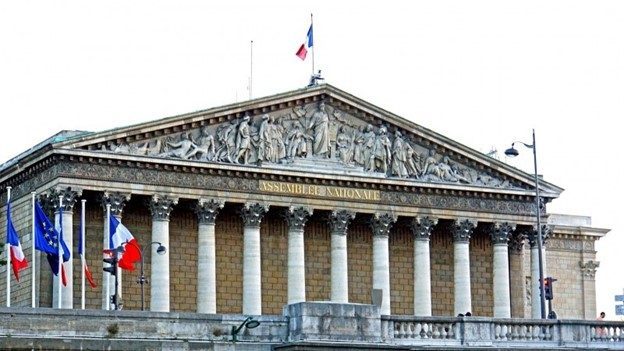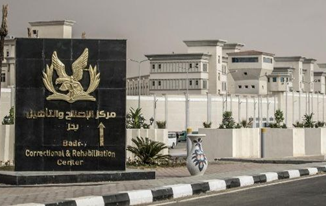
A number of human rights organizations and defenders on Wednesday sent a letter to the French parliament, calling on the French MPs to interfere to cancel or even commute the politicized death sentences against 12 innocents.
The alleged convicts included Muslim Brotherhood leaders, former ministers, MPs, academics and January Revolution icons, that were exposed to unfair politicized trials, based on trumped-up charges.
The statement read:
The signatories of this statement address the French Parliament, as representative of the French people with a long history in defending human rights, calling for the support of its members in a case that touches on the essence of human rights, the right to life.
Last week, the Egyptian Court of Cassation upheld the death sentence of 12 Egyptians in Case No. 34150 of 2015, known in the media as the Rab’a sit-in dispersal case. Among those against whom the verdict was upheld, Dr. Osama Yassin, Minister of Youth in the government of Dr. Mohamed Morsi, Dr. Mohamed El-Beltagy, a professor at the Faculty of Medicine and a well-known parliamentarian and one of the icons of the January 25 revolution, and Dr. Ahmed Aref, a dentist and official spokesman for the Muslim Brotherhood in Egypt.
Included also are four convicts that were arrested about a month before the dispersal of the Rab’a sit-in, which confirms impossibility of their involvement in the charges of which they were convicted. This case, like others, lacked the lowest standards of justice and was considered before a special court circuit. Thus these twelve innocents have joined 81 others who are awaiting execution at any moment against the backdrop of their political stances.
It is noteworthy that the authority of Abdel Fattah El-Sisi continues to issue and implement death sentences, the latest of which was the rulings in the case known in the media as the storming of the Kerdasa police station case, where convicts were executed in May this year.
In April 2021, Amnesty International issued a report on the number of death sentences issued in 2020. While the general trend around the world tends towards abolition of the death penalty and the decrease in the number of implemented death sentences, the report monitored a threefold increase in the number of executions in Egypt, rising from 39 executed sentences in 2019 to 107 sentences executed in 2020. Thus, Egypt surpassed Saudi Arabia in terms of ranking, to occupy the third place globally among the countries carrying out death sentences.
Unfortunately, since the summer of 2013, the Egyptian authorities have transformed judicial mechanisms into an integrated system of repression that is not limited to issuing and arbitrarily implementing sentences that restrict public freedoms, but also issuing unprecedented numbers of death sentences against its opponents while carrying out dozens of them, in clear violation of international covenants, and the Universal Declaration of Human Rights. Most of these rulings were issued after unfair trials that lacked the most basic standards of justice before special courts established by the Egyptian authorities since the summer of 2013 to prosecute all opponents or civil society activists.
A joint report of three human rights organizations documented the issuance of 1,569 death sentences based on the political stances of the convicts from 2013 to 2020.
Another report concluded that 1,063 of those death sentences were handed down by 19 judges in those special courts.
The International Committee Against Torture, Human Rights Watch and Amnesty International have expressed their grave concern about these provisions, where confessions are extracted from convicts under torture and through constant threats and abuse of their family members.
It is worth noting that according to the report of the International Committee against Torture in 2017, the use of torture has become systematic in the practices of the Egyptian security authorities. Perhaps the file of the Italian researcher Giulio Regeni is a glaring example of these violations and disregard for the sanctity of human life and human dignity.
The practices of Abdel Fattah El-Sisi’s authority violated all the promises he made to the European Union within the Egyptian-European Cooperation Declaration when he affirmed his respect for human rights and related agreements.
Al-Sisi also disregarded several statements, including the condemnation statement issued by the European Parliament in 2018 regarding these executions, and the United Nations spokesperson’s statement about his concern about the lack of fair trial standards in the trials in which death sentences were issued.
The silence of the European Union regarding Sisi’s execution of 15 death sentences in February 2019, two months after the European Commission called on the Egyptian Foreign Minister to suspend executions, raised a question mark in front of the Egyptian civil society aspiring for freedom and democracy, while the continuation of, and indeed the increase in cooperation with, the Al-Sisi regime and the visit of European leaders to Egypt, receiving him in Paris 2020 and 2021, and granting him the highest honors, serve as a green light for the Egyptian authorities to continue issuing and carrying out death sentences against political opponents, as the number of those executed in cases against a political background reached 97 people from 2013 to April 2021.
Those who are familiar with that sad scene see in all of the above a contradiction with the French and European founding principles in favor of human rights, and a great damage to the mental image of the French Republic among a wide sector of the Egyptian and Arab peoples.
In the end, we turn to the French Parliament, hoping to take a clear, strong and biased position towards the principles of human rights calling on the Egyptian government to stop the executions, so that the Parliament’s position fits with the longstanding principles of the French people and contributes to restoring the Egyptian civil society’s lost confidence, as a result of the government’s adoption The French policy of exalting the narrow immediate interests in its dealings with the current Egyptian authority at the expense of the ancient values of the French Republic and the interests of strategic partnership with the peoples aspiring for freedom.
Background
On 14 June 2021, Egypt’s highest civilian court on Monday upheld death sentences for 12 senior Muslim Brotherhood figures over the 2013 Rab’a sit-in which ended with a massacre, where the army and security forces killed hundreds of protesters.
The ruling, which cannot be appealed, means the 12 men could face execution pending approval by Egypt’s Abdel Fattah al-Sisi. They include Abdul Rahman Al-Bar, commonly described as the group’s mufti or top religious scholar, Mohamed El-Beltagi, a former member of parliament, and Osama Yassin, a former minister.
Many Muslim Brotherhood figures have been sentenced to death in other cases related to the unrest that followed the military’s ousting of Brotherhood president Mohamed Mursi in 2013, but the Court of Cassation ordered retrials.
Rights groups have documented a sharp rise in the number of executions in Egypt, with at least 51 carried out so far this year according to Amnesty International.
“Instead of continuing to escalate their use of the death penalty by upholding death sentences following convictions in grossly unfair mass trials Egyptian authorities must immediately establish an official moratorium on executions,” Amnesty said in a statement.
The recent ruling relates to a mass trial of hundreds of suspects accused of murder and incitement of violence during pro-Brotherhood protests at Rab’a al-Adawiya square in Cairo in the weeks after President Morsi’s overthrow.
In September 2018, an Egyptian criminal court sentenced 75 people to death and issued varying jail terms for more than 600 others. Many defendants were tried in absentia.
Forty-four of those sentenced to death appealed to the Court of Cassation. Thirty-one had their sentences changed to life in prison, while death sentences were upheld for 12 others.
A final defendant, the senior Muslim Brotherhood leader Essam el-Erian, died in prison in Cairo in August 2020. Mursi, Egypt’s first democratically elected president, died in prison in 2019.
The court also upheld jail terms for many other defendants including a life sentence for Mohamed Badie, leader of the outlawed Brotherhood, and a 10-year jail term for Morsi’s son Osama, the judicial sources said.



